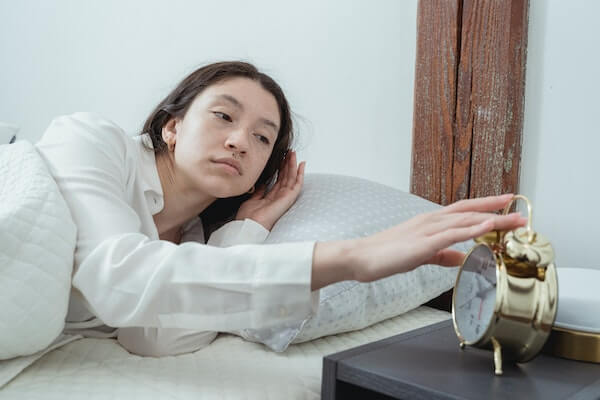
One of the best things you can do for your mind, body, and overall health is to get enough sleep. It’s not always easy to turn in early, though. You might have trouble falling asleep or else stay up most of the night worrying about all the things you have to do. There are many ways to help yourself get more restful sleep at night. Here are five simple methods that can help you sleep better tonight.
Make your bedroom sleep-friendly

The first step to getting good sleep is to make your bedroom as sleep-friendly as possible. This means it should be dark, quiet, and comfortable.
One aspect of sleep hygiene that is often overlooked is the environment in which we sleep. Creating a quiet and dark bedroom can be crucial for getting good quality sleep.
One of the primary reasons why a quiet and dark bedroom is important for good sleep is that it helps to regulate the body's natural sleep-wake cycle. This cycle is controlled by a hormone called melatonin, which is produced by the pineal gland in the brain. Melatonin levels naturally rise in the evening as the sun sets, signaling to the body that it is time to wind down and prepare for sleep.
However, noise and light can disrupt this natural process. Noise, especially sudden or loud noises, can trigger the body's stress response and make it difficult to relax and fall asleep. Similarly, light can interfere with the production of melatonin and make it harder to fall asleep and stay asleep.
A quiet and dark bedroom helps to create an environment that is conducive to sleep by reducing distractions and promoting relaxation. When there is less noise and light present, it is easier for the body to relax and release the tension that can build up throughout the day. This can help to improve the quality of sleep, leading to better rest and a more refreshed feeling in the morning.
In addition to regulating the sleep-wake cycle, a quiet and dark bedroom can also help to reduce the risk of sleep disorders. Noise and light can both interfere with sleep, but they can also exacerbate existing sleep disorders such as insomnia or sleep apnea. By creating a quiet and dark bedroom, it is possible to reduce the impact of these disorders and improve sleep quality.
It is worth noting that complete darkness and silence may not be possible or practical for everyone. However, there are steps that can be taken to minimize noise and light in the bedroom. Using earplugs or a white noise machine can help to block out unwanted noise, and blackout curtains or an eye mask can help to block out light.
Take control of your thoughts

One of the best things you can do is to take control over your thoughts.
Learning to take control of your thoughts and emotions can be a powerful tool for improving sleep and overcoming insomnia. By becoming more aware of your thought patterns and learning how to manage them, you can create a more peaceful and restful environment for sleep.
One way to take control of your thoughts is through the practice of mindfulness. Mindfulness is a form of meditation that involves paying attention to the present moment, without judgment. When you are mindful, you focus your attention on your breath, your body, and your surroundings, rather than getting caught up in your thoughts and emotions.
By practicing mindfulness before bed, you can calm the mind and create a more conducive environment for sleep. When you are aware of your thoughts and emotions, you can choose to let go of the ones that are not helpful or conducive to sleep, and instead focus on relaxing and letting go of tension.
Another way to take control of your thoughts and emotions is through the use of positive affirmations. Positive affirmations are statements that you repeat to yourself, either out loud or in your head, that are designed to shift your focus and mindset towards the positive. When you repeat affirmations before bed, you can train your mind to focus on positive and calming thoughts, rather than dwelling on negative or anxiety-provoking ones.
For example, you might try saying affirmations like "I am calm and at peace" or "I release all tension and worry as I drift off to sleep." Repeating these affirmations can help to shift your focus away from racing thoughts and towards a more peaceful and relaxed state.
Another helpful technique for taking control of your thoughts is to write down your worries and concerns before bed. This can help to "empty out" your mind and create a sense of closure, allowing you to let go of your worries and focus on sleep.
Stick to a sleep schedule

Your body has a natural clock. And this natural clock is called
your circadian rhythm. It’s what tells you when it's time to go to
sleep, when it's time to wake up, how much energy you have, and
even your hunger levels. To help yourself get more restful sleep
at night, try to keep the same sleep schedule every day of the
week. You might find that you're more tired or less tired on
certain days than others, but if you stay consistent with your
sleep schedule, your body will become used to it and better
regulate itself.
When you have a set bedtime and wake-up time, your body's natural sleep-wake cycle, or circadian rhythm, can sync up with these times and help you fall asleep and wake up more naturally.
There are several benefits to having a sleep routine. First and foremost, it can help you fall asleep faster and sleep more soundly. When you go to bed and wake up at the same time every day, your body becomes accustomed to this schedule and knows when it's time to wind down and sleep. This can make it easier to fall asleep at night and can lead to more restful sleep.
In addition to helping you fall asleep faster and sleep more soundly, a sleep routine can also improve your overall health and well-being. Getting enough sleep is important for maintaining physical and mental health. When you don't get enough sleep, you may feel tired and sluggish during the day, which can affect your productivity and overall quality of life. On the other hand, when you get enough sleep, you may feel more alert and energetic during the day, which can help you be more productive and enjoy a higher quality of life.
Having a sleep routine can also help you manage stress and anxiety. When you have a consistent bedtime and wake-up time, you can create a sense of routine and structure in your life, which can help reduce stress and anxiety. In addition, the relaxation and mindfulness techniques that are often incorporated into a sleep routine, such as reading a book or practicing deep breathing, can also help reduce stress and improve your overall well-being.
There are several factors that can disrupt your sleep routine and make it difficult to get a good night's sleep. These include things like caffeine and alcohol consumption, irregular meal times, and exposure to screens before bedtime. By being mindful of these factors and making adjustments to your habits, you can help establish a consistent sleep routine that will help you sleep better.
One of the most important things you can do to establish a sleep routine is to set a consistent bedtime and wake-up time. This means going to bed and waking up at the same time every day, even on weekends. While it can be tempting to stay up late on the weekends or sleep in, doing so can disrupt your sleep-wake cycle and make it harder to fall asleep during the week.
Turn off electronics an hour before bedtime
One of the easiest ways to improve your sleep is to avoid electronics before bedtime. You may not even realize how much you use your phone or television right before bedtime, but the light emitted from these devices actually tricks your brain into thinking it’s still daytime. This can cause your body to produce too much melatonin, which makes it difficult for you to get up in the morning and get to sleep at night. In addition, the content on screens, such as social media, emails, or news, can be stimulating and keep your mind active, making it harder to relax and fall asleep.
In addition to the benefits for sleep, avoiding screens before bedtime can also have other benefits for your overall health and well-being. For example:
-
Reducing eye strain: Looking at screens for extended periods of time can cause eye strain and fatigue. By avoiding screens before bedtime, you can give your eyes a break and reduce the risk of eye strain.
-
Improving relationships: When you spend less time on your devices, you may find that you have more time to connect with others in person, which can improve your relationships and overall sense of well-being.
-
Reducing stress and anxiety: The constant notifications and alerts from your devices can be stressful and contribute to anxiety. By avoiding screens before bedtime, you can give yourself a break from this constant stimulation and reduce stress and anxiety.
So, how can you avoid screens before bedtime? Here are a few tips:
-
Set a bedtime for your devices: Just like you have a bedtime for yourself, you can also set a bedtime for your devices. This means turning off your screens at least an hour before you go to bed.
-
Keep screens out of the bedroom: To create a sleep-friendly environment, it's best to keep screens out of the bedroom. This can help prevent the temptation to check your phone or watch TV before bed.
By following these tips, you can avoid screens before bedtime and improve your sleep. While it may take some time to adjust to a new routine, the benefits for your sleep and overall health and well-being are well worth the effort.
Be mindful of what you’re eating and drinking

Eating and drinking habits can have a significant impact on sleep
quality. Being mindful of what you consume can help you get a good
night's rest, while poor eating and drinking habits can lead to
sleep disruptions and difficulties.
First, let's consider the role of diet in sleep. It's important to
pay attention to the types of foods you eat and how they may
affect your sleep. For example, heavy, rich meals close to bedtime
can cause indigestion and discomfort, which can make it hard to
fall asleep or stay asleep. On the other hand, eating a light
snack before bed can actually help you sleep, as long as it
contains ingredients that promote sleep. Some examples of
sleep-promoting foods include tart
cherries, which are high in melatonin, and kiwi fruit, which
has been shown to improve sleep onset and duration.
It's also important to pay attention to the nutrients you're
getting from your diet. A lack of certain nutrients can lead to
sleep problems. On the other hand, getting enough of certain
nutrients, such as calcium
and magnesium, can help you sleep better.
In addition to paying attention to the types and nutrients of the
foods you eat, it's also important to be mindful of your overall
eating habits. Overeating or undereating can both lead to sleep
problems. Overeating can cause discomfort and indigestion, while
undereating can lead to hunger and low blood sugar, both of which
can disrupt sleep. It's important to find a healthy balance and
eat regular, balanced meals to support good sleep.
Now let's turn to the role of hydration in sleep. It's important
to stay hydrated, as even mild dehydration can disrupt sleep. When
you're dehydrated, your body's natural cooling system doesn't work
as well, which can make it harder to fall asleep and stay asleep.
In addition, being dehydrated can lead to restless leg syndrome,
which can also disrupt sleep.
It's also important to be mindful of what you're drinking, as
certain beverages can have an effect on sleep. For example,
alcohol may help you fall asleep initially, but it can disrupt
sleep later in the night. This is because alcohol interferes with
the normal sleep process and can lead to fragmented sleep.
Similarly, caffeine
is a stimulant that can disrupt sleep, so it's important to avoid
consuming it close to bedtime.
Finally, it's worth noting that eating and drinking habits can
have an indirect effect on sleep through their impact on overall
health. For example, a diet high in processed foods and sugar can
lead to health problems such as obesity, diabetes, and heart
disease, which can all disrupt sleep. Similarly, a diet low in
fruits, vegetables, and other nutrients can lead to deficiencies
that can affect sleep. On the other hand, a healthy diet that is
rich in fruits, vegetables, and other nutrients can support
overall health and good sleep.
Paying attention to the types and nutrients of the foods you eat,
as well as your overall eating habits, can help you get a good
night's rest. It's also important to stay hydrated and be mindful
of the beverages you consume, as they can affect sleep. By making
healthy choices, you can support both your overall health and good
sleep.
Exercise regularly

Exercise is an important
factor in sleep quality. Regular physical activity can help
you fall asleep faster, sleep more deeply, and wake up feeling
more refreshed. On the other hand, a lack of exercise can lead to
sleep problems.
First, let's consider how exercise can improve sleep. When you
engage in physical activity, your body temperature rises. This
increase in body temperature is followed by a drop in temperature,
which can help you fall asleep. In addition, exercise can help you
sleep more deeply by releasing endorphins, which are chemicals
that promote feelings of happiness and relaxation. Finally,
exercise can help you wake up feeling more refreshed by improving
the overall quality of your sleep.
So, what are the specific benefits of regular exercise for sleep?
For one, regular exercise can help you fall asleep faster. This is
because physical activity can tire you out, which can make it
easier to fall asleep. In addition, exercise can improve the
overall quality of your sleep, making it easier to stay asleep
throughout the night. This is especially true for people who have
trouble sleeping due to conditions such as insomnia or restless
leg syndrome.
Regular exercise can also help you wake up feeling more refreshed.
This is because exercise can improve the duration and depth of
your sleep, leading to a more restful night's rest. In addition,
exercise can help you feel more alert and energetic during the
day, which can make it easier to get out of bed in the morning.
Now, let's consider the role of exercise in preventing sleep
problems. A lack of physical activity can lead to sleep problems
such as difficulty falling asleep, difficulty staying asleep, and
poor sleep quality. This is because a sedentary lifestyle can lead
to an increase in stress and anxiety, which can disrupt sleep. On
the other hand, regular exercise can help reduce stress and
anxiety, which can improve sleep.
It's also important to consider the timing of your exercise.
Engaging in physical activity close to bedtime may be too
stimulating and may make it harder to fall asleep. Instead, aim to
exercise at least a few hours before bedtime.
Exercise can help you fall asleep faster, sleep more deeply, and
wake up feeling more refreshed. It can also help prevent sleep
problems by reducing stress and anxiety. However, it's important
to consider the type and intensity of exercise, as well as the
timing of your workouts, to maximize the sleep benefits. By making
physical activity a regular part of your routine, you can support
both your overall health and good sleep.
Share your story and inspire others
Got a great tip or a story to inspire others? Join the KeepActive Facebook group or tag us on Instagram or Facebook to share your tips or story. There are a lot of people unsure about starting their fitness journey or meeting strangers, seeing stories and photos from other people can inspire others to take their first step.






